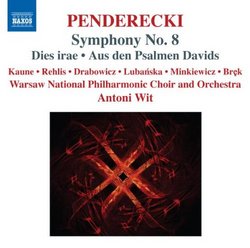| All Artists: Kryzysztof Penderecki Title: Penderecki: Symphony 8 - Dies Irae / Aus Den Psalmen Davids Members Wishing: 0 Total Copies: 0 Label: Naxos Original Release Date: 1/1/2008 Re-Release Date: 1/29/2008 Genre: Classical Styles: Opera & Classical Vocal, Historical Periods, Early Music, Symphonies Number of Discs: 1 SwapaCD Credits: 1 UPC: 747313045075 |
Search - Kryzysztof Penderecki :: Penderecki: Symphony 8 - Dies Irae / Aus Den Psalmen Davids
 | Kryzysztof Penderecki Penderecki: Symphony 8 - Dies Irae / Aus Den Psalmen Davids Genre: Classical
|
Larger Image |
CD Details |
CD ReviewsPenderecki's Latest Triumph Dean R. Brierly | Studio City, CA | 01/30/2008 (5 out of 5 stars) "Any new release by Polish composer Krzysztof Penderecki is cause for celebration, and this world premiere recording of his "Eighth Symphony," written in 2005, is no exception. It's a large-scale vocal work based on 19th and 20th Century poems by Goethe, Rilke and others that collectively address the cycle of birth, decay, death and rebirth from the perspective of man and his impact on the environment. As one might expect from such a big thematic canvas, the music embodies a dazzling range of textures and emotions. Those familiar with Penderecki's avant-garde works may, however, be surprised at how tonal and accessible this symphony is. At this stage of his life, Penderecki no longer seems as preoccupied with being in the vanguard of musical experimentation. While his music is still complex and challenging, it's assumed a sleeker, more romantic veneer that's seen to brilliant effect in this latest work. His new symphony is scored for soprano, mezzo-soprano and baritone voices, choir and orchestra, with the instrumentation playing a vital, but clearly supporting role to the vocals. It's like listening to a set of Lieder, only with larger and more complex musical accompaniment. The singers on this disc (members of the Warsaw National Philharmonic Choir) are profoundly engaged with the material and keenly in sync with the symphony's many moods. The 12 movements, most of them fairly short, are by turns contemplative, elegiac and mournful, yet never angry or despairing. Indeed, this is among Penderecki's most inspirational and uplifting works. Also on the disc is a new recording of "Dies Irae," Penderecki's 1967 musical response to the Holocaust. This is a much darker, more despairing work. It's also much more abstract, with otherworldly vocal effects and some orchestral dissonances. Voices and instruments are so well integrated as to be almost indistinguishable at times. Penderecki's brilliant synthesis makes for an unforgettable, deeply moving experience that both embraces and transcends his personal engagement with the subject matter. "Psalms of David" is an early vocal work (1958) for mixed choir, strings and percussion. The music is aggressive and challenging, and reveals Penderecki, then just 25, already manifesting impressive technical innovation and emotional commitment." Early and recent works by Penderecki P. Alvarez | Killeen, Texas United States | 11/03/2008 (5 out of 5 stars) "Symphony #8 "Lieder Verganglichkeit" composed in 2005, and
recorded here for the first time, is a work very much in the spirit of the late romantic German comporsers. In this work set to poems of German poets, one can hear a bit of the style of the Mahler symphonies and a bit of the early style of Schoenberg. The Symphony # 8 is score for large orchestra, vocal soloists, and a bass trumpet only heard in parts of the last movement(Yes, it sounds like a trombone but it's not, it's a bass trumpet). This recording also includes the Dies Irae composed in 1967, also for orchestra, chorus and soloists (thou the orchestra part is written for dissimilar forces in comparison to the 8th symphony)is what we come to expect from the composer's religious works, and so is his "Aus den Psalmen Davids". The Warsaw National Philharmonic under Mr. Antoni Wit,who does a great, as so did the soloists and chorus as well." |

 Track Listings (19) - Disc #1
Track Listings (19) - Disc #1